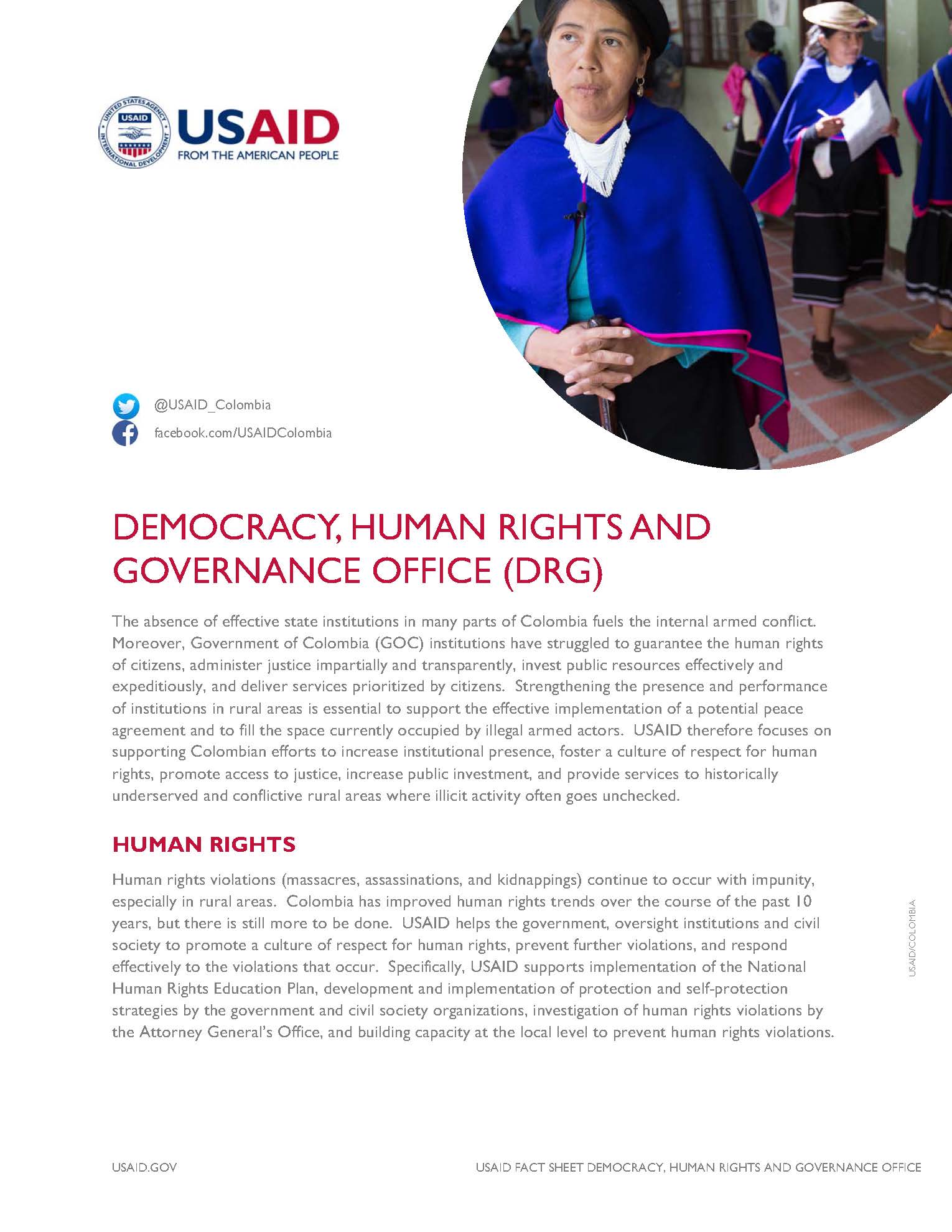Democracy, Human Rights and Governance Office (DRG) ![]() (pdf - 100k)
(pdf - 100k)
The absence of effective state institutions in many parts of Colombia fuels the internal armed conflict. Moreover, Government of Colombia (GOC) institutions have struggled to guarantee the human rights of citizens, administer justice impartially and transparently, invest public resources effectively and expeditiously, and deliver services prioritized by citizens. Strengthening the presence and performance of institutions in rural areas is essential to support the effective implementation of a potential peace agreement and to fill the space currently occupied by illegal armed actors. USAID therefore focuses on supporting Colombian efforts to increase institutional presence, foster a culture of respect for human rights, promote access to justice, increase public investment, and provide services to historically underserved and conflictive rural areas where illicit activity often goes unchecked.
HUMAN RIGHTS
Human rights violations (massacres, assassinations, and kidnappings) continue to occur with impunity, especially in rural areas. Colombia has improved human rights trends over the course of the past 10 years, but there is still more to be done. USAID helps the government, oversight institutions and civil society to promote a culture of respect for human rights, prevent further violations, and respond effectively to the violations that occur. Specifically, USAID supports implementation of the National Human Rights Education Plan, development and implementation of protection and self-protection strategies by the government and civil society organizations, investigation of human rights violations by the Attorney General’s Office, and building capacity at the local level to prevent human rights violations.
DELIVERY OF PUBLIC SERVICES
Helping Colombia to ensure that government services reach citizens, especially marginalized populations in historically neglected areas, is crucial to building lasting and inclusive peace in the regions. USAID supports efforts to focus public investment toward traditionally marginalized areas. For example, USAID is helping the GOC’s National Planning Department and sub-national governments to implement a multi-billion dollar royalties system that re-directs revenues generated by income from the country’s natural resource wealth to underserved and conflictive areas. USAID also supports capacity development for 40 municipal governments to improve their financial management systems and processes for gathering citizen input. Assistance is also provided to strengthen the organizational and advocacy skills of civil society organizations to empower citizens and help them influence government through democratic means. Moreover, USAID helps national and local authorities, as well as civil society organizations, set up transparent systems that facilitate increased citizen oversight of the use of public resources to reduce corruption. Efforts to increase oversight and advocacy to reduce electoral fraud and strengthen the electoral system are also supported.
ACCESS TO JUSTICE
The ability of the Colombian state to resolve grievances, whether through the formal justice system or alternative dispute resolution mechanisms, is essential for building the social fabric of communities that are recovering from decades of conflict. If justice services are not made increasingly accessible in rural areas, illegal armed actors will continue to occupy the power vacuums and victimize citizens. USAID helps the GOC promote greater access to justice in 30 municipalities through services offered by justice houses, mobile justice brigades and alternative dispute resolution mechanisms. Support is also provided to reform justice institutions, increasing the quality and efficiency of formal justice services. Assistance to both civil society and justice institutions helps to address the unique barriers to justice for women, particularly regarding gender-based violence. In addition, USAID provides assistance to the land restitution courts and judges to improve the efficiency, consistency and reliability of rulings to help persons displaced by the armed conflict return to their lands.
KEY ACHIEVEMENTS
- Development and implementation of the National Ombudsman’s nationwide early warning system to prevent human rights abuses.
-
Over 5,000 human rights defenders trained on human rights, with a concentration on issues such as vulnerable populations, anti-discrimination, gender-based violence, and mechanisms for promotion, protection and response to human rights violations.
-
Assisted in the mobilization of more than $1 billion of GOC royalties funds to improve service delivery and increase the legitimacy of the state in targeted rural conflict-affected regions.
Increased citizen oversight of elections and early warning systems for electoral fraud and violence that led to less violence and more evidence collected for authorities to investigate and prosecute fraud in the recent nationwide local elections.
-
Mobile justice brigades provided 10,502 rural citizens with legal and administrative services.
-
Training methodology designed and deployed for prosecutors and police to investigate gender-based violence cases in coordination with the Attorney General’s Office and other entities.
-
First judicial governance structure in Colombia established by the Specialized Jurisdiction for Land Restitution.
-
Attorney General’s Office developed and deployed a case prioritization system that facilitates the analysis of crimes to identify the intellectual authors of those crimes and prosecute organized criminal activity.
Related Links








Comment
Make a general inquiry or suggest an improvement.